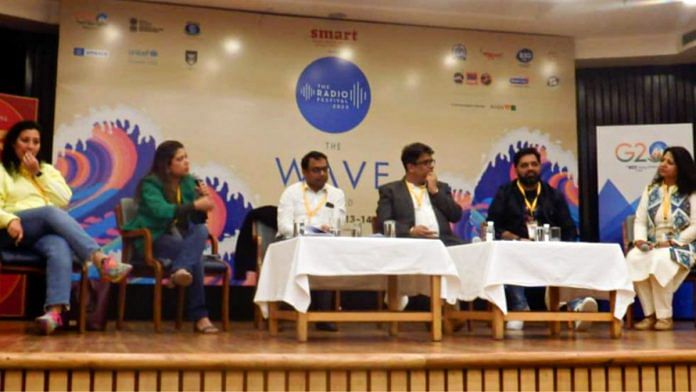New Delhi: The Radio Festival’s 6th edition took place on 13 and 14 February at the India International Center in New Delhi. The two-day event celebrated the many avatars of radio broadcasting today – private, public, and community – amid a lingering concern. They cannot read out news bulletins.
As per government regulations, only government-run All India Radio can broadcast news on air. The Ministry of Information and Broadcasting guidelines obstruct private radio channels from reading news on air.
In a conversation with ThePrint, Archana Kapoor, the founder of the festival as well as of the community radio station – Radio Mewat, spoke of the blurred lines between ‘what constitutes news and what doesn’t.’
“If we are discussing Mann Ki Baat, or Pariksha Par Charcha, we are discussing news,” she said, adding that it is high time that radio broadcasting services are allowed to do news on air.
“People want to know about their immediate environment, and the Internet is not accessible to all. Let me tell you, my community itself is my biggest monitor. If we say something that causes distress, we are hauled up,” Kapoor stated.
Also read: PM Modi greets people on World Radio Day
Addition of news content
At the festival, RJ Nasir, who works with DPS radio, based in Kashmir, referred to the difference between news dissemination in a relatively stable environment, like Delhi, and a conflict zone, like Kashmir –– where curfews are a routine practice and internet blockages are the norm.
“Radio then becomes the only available source of information for people from all social backgrounds,” he said. Since all events cannot fall under the ambit of national or state news, local broadcasters should be allowed to broadcast news in the public interest, with “decent monitoring.”
The government’s refusal to comply with such requests is allegedly due to the lack of clarity on listenership data. The broadcaster’s unawareness about how many people are listening to their content means that its impact cannot be predicted. To avoid “public tension,” the government restricts the reading of news to All India Radio.
“If you are broadcasting facts, it’s news. But if you mix it with opinion, it becomes misinformation or biased opinion. The problems that can arise out of this probably overshadow the pros of providing private broadcasters with permission to run news,” said Guru Prasad, Director of All India Radio.
According to radio broadcasters, the addition of news to their content will lead to an increase in listenership. They also talked about the importance of inserting opinions –– popular opinion is how they gain popularity. And popular opinion may not align with that of the government or the advertisers.
Also read: World Radio Day: Just tune in, radio’s charm persists on simplicity, accessibility



